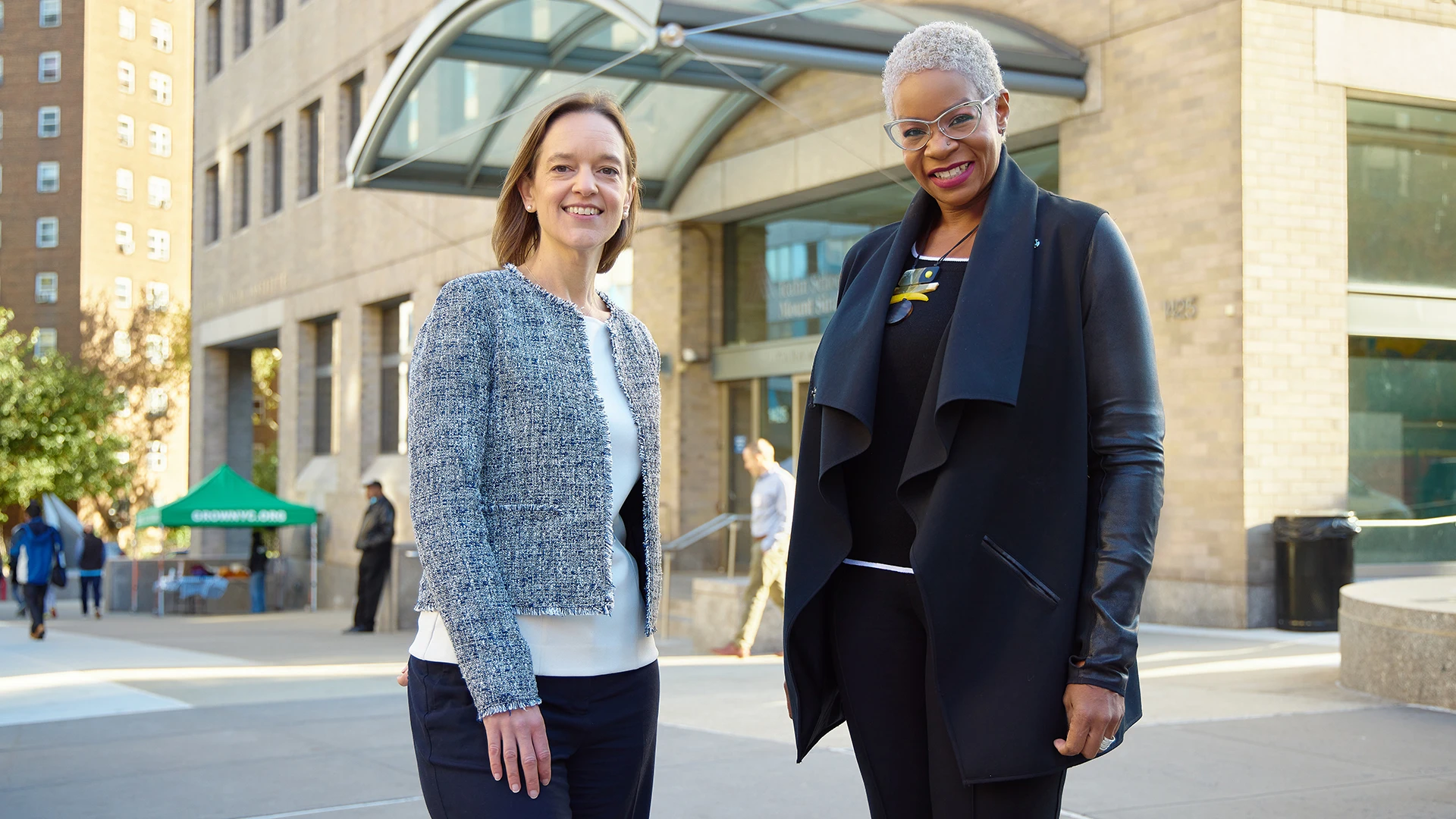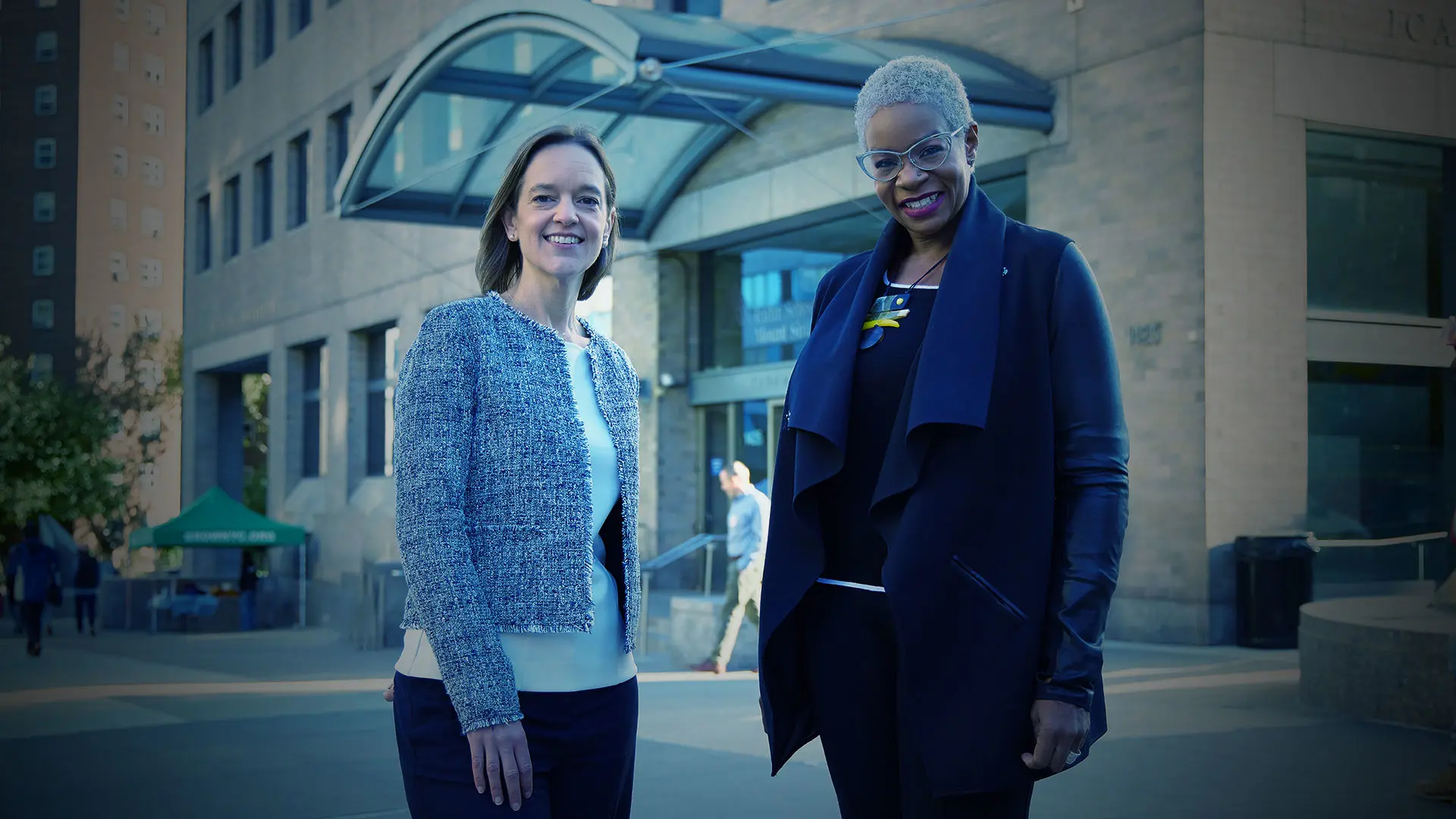The values of equity and inclusivity have always been part of the Brookdale Department of Geriatrics and Palliative Medicine at the Icahn School of Medicine at Mount Sinai. But clinicians and staff are constantly challenging themselves to further raise awareness, review policies, and do everything possible to create an “arms-wide-open” culture for professionals and patients alike.
“In the spring of 2020 when we saw the devastating disparities in the impact of COVID-19 in New York, and also witnessed the videotaped murder of George Floyd, those events were a wakeup call to step up and do more,” says Amy Kelley, MD, MSHS, Hermann Merkin Professor in Palliative Care and Vice Chair of Health Policy and Faculty Development for the Brookdale Department. “There was a groundswell within our department of people wanting to come together to further increase our awareness and knowledge around diversity, equity, and inclusion, and to take action towards making things better.”

Amy Kelley, MD, MSHS, left, Hermann Merkin Professor in Palliative Care and Vice Chair of Health Policy and Faculty Development for the Brookdale Department, and Tremayne Cunningham, MS, Vice Chair of Administration and Finance
The Brookdale Department committed itself to creating an environment that is diverse, equitable, and inclusive (DEI), as well as promoting anti-racism efforts at Icahn Mount Sinai, across the Mount Sinai Health System, and throughout the community. Such initiatives are geared not only toward creating a more inclusive workplace but toward providing the best possible services to all patients, which includes enhancing and improving many aspects of geriatrics and palliative medicine.
“We know that the best science, the best thinking, and the best medical care happens when we have as many different perspectives as possible contributing, so that is our goal,” says Dr. Kelley, who is also Senior Associate Dean for Gender Equity in Research Affairs.
Department Initiatives
Understanding that a mission of celebrating differences and confronting challenges needs to be grounded in action and policy, the Brookdale Department has begun implementing a number of new practices and programs. A team of highly committed DEI champions lead these efforts: Stephanie Chow, MD, Noelle Marie Javier, MD, Martine Sanon, MD, Katherine Brown, MS, and Sasha Perez, MPH.
Among the first steps enacted in the spring of 2020 was a departmental town hall, during which Department Chair R. Sean Morrison, MD, Ellen and Howard C. Katz Professor and Chair, and Tremayne Cunningham, MS, Vice Chair of Administration and Finance, led a discussion by sharing their distinct perspectives, thoughts, and experiences. (The recording was subsequently posted to our departmental Facebook page to continue the conversation.) The Brookdale Department also began holding roundtable focus groups to hear colleagues’ personal experiences, and opened a virtual feedback box that welcomes staff members to anonymously submit questions, kudos, or apprehensions.
In addition, the Brookdale Department started a book club that read authors from varied backgrounds. That program evolved into a learning pathway series that invites participants to explore art and literature through different lenses, including Black American, Asian, Jewish, and more.
“I'd like to think we were already doing things really well, of course there's always room to grow,” says Ms. Cunningham. “These initiatives opened opportunities for us to hear voices and experience different things in health care that we just didn't know about.”
From a policy standpoint, even prior to 2020 the Brookdale Department had begun an examination of pay structures to look for evidence of inequity in compensation by gender, race, and ethnicity. The Department also analyzed promotion patterns to uncover any unfair practices.
Along with such departmental self-examination came a willingness to ask difficult questions and hear tough truths.
“This is really hard stuff, and it hasn’t been all sunshine and roses,” says Dr. Kelley. “When someone you work with is willing to share what it’s been like to walk through the world in their skin, it can be heartbreaking. You realize that under their everyday smile there may be pain, frustration with unfair challenges, and incredible resilience. But looking at the hard stuff as a department is part of what moves us forward together.”
How DEI Programs Impact Geriatrics and Palliative Care Patients
Such awareness promises to enhance and improve many aspects of geriatrics and palliative medicine.
One concrete initiative has been identifying and challenging ageism across all fields and service lines. With the help of a grant from the American Board of Internal Medicine, several Brookdale Department faculty members, led by Dr. Javier, Dr. Chow, and Ravi Ramaswamy, MD, are developing a curriculum for third-year medical students to tackle ageism in clinical settings. Whether those students go out into the world as geriatricians, surgeons, internists, or any other specialty, this early-stage training will benefit the older adults they serve.
In addition, the relative youth of geriatrics and palliative care as a field holds great opportunities for improvement from a diversity, equity, and inclusion standpoint.
"Our field has grown tremendously, but we don’t yet have the diversity among our providers to reflect the patients and families we care for,” says Dr. Kelley, who notes that Mount Sinai’s location in New York City positions its clinicians to serve an extraordinarily mixed population. “We are trying to figure out the best ways of growing by increasing educational and training opportunities as early in the pipeline as medical school and even college,” she says.
Another aspect of geriatrics and palliative medicine that positions it to benefit from diversity, equity, and inclusion initiatives is the intimate nature of care delivery, which often involves providing services in patient homes.
“One of the greatest honors of practicing this type of medicine is to be invited into a person's life and family to participate in their care,” says Dr. Kelley. Such personalized attention makes understanding and respecting all beliefs, cultures, lifestyles, and perspectives especially crucial.
Such awareness also extends to caregivers. Research conducted over the last six years by Dr. Kelley and her colleagues Katherine Ornstein, PhD, and Jennifer Reckrey, MD, shows that caregiving burdens, in terms of both time and money, are often most challenging for underrepresented populations.
“There's a lot we need to do as a field to think about health care industry policies that can play out differently across racial and ethnic groups, and to think about social and economic barriers to accessing adequate care,” Dr. Kelley says.
But even if all these issues were addressed today, this crucial work would never be done.
“Right now we’re thinking about COVID-19 and the incidents of racial unrest, and we’re trying to create policies that respond to these world occurrences, but we'll constantly be pivoting,” says Ms. Cunningham. “Human nature looks for differences, so until we put more energy into looking for what unites us, we’ll always have these conversations and conflicts—and hopefully resolutions and solutions. That's the human experience.”
